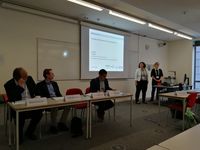News Detail
Policy Session “The Role of Non-State Actors in Climate Policy” at the Annual Conference of the European Association of Environmental and Resource Economists (EAERE)
Manchester, Great Britain, 26 to 29 June 2019
National laws and regulations introduced by state actors are unlikely to be sufficient to meet the emission targets set in the Paris Climate Agreement. For example, the policies implemented or pledged in Japan and in the EU are deficient to deliver the emission reductions specified in their NDCs for 2030. Since the expected gap between required and actual emissions reveals a lack of climate action measures, they have to be supplemented by additional voluntary climate protection activities. In this context, a third societal actor has increasingly gained attention: Non-state actors are expected to help bridging the gap between the state and individuals engaged in climate protection (UNEP, 2016). The policy relevance of such approaches becomes apparent for example by the G20 Hamburg Climate and Energy Action Plan for Growth of July 2017, in which G20 leaders declared that “[they] […] encourage the further engagement of […] a multitude of non-state actors to support parties in implementing the Paris Agreement”.
In order to get a better understanding of the different roles of non-state actors, their contribution and the limitations they face Dr. Christiane Reif and Carina Fugger from Leibniz Centre for European Economic Research (ZEW) organized a policy session at the Annual Conference of the European Association of Environmental and Resource Economists (EAERE). The following panellists were invited to discuss these issues: Mark Atherton, Asst. Director of Environment, Greater Manchester Combined Authority (GMCA), Ibon Galarraga, Research Professor Basque Centre for Climate Change (BC3), Götz Reichert, Head of the Department on European Energy, Environment, Climate and Transport Policy at the Centre for European Politics (cep) and Niels Anger, Deputy Head of Division for EU Electricity Affairs at the German Federal Ministry for Economic Affairs and Energy (BMWi).
The session started with short input presentations about the major roles of different non-state actors in global environmental governance. The speakers shortly presented their view on non-state actors based on their professional background, which includes economic, legal, ethical and practical perspectives. Followed by a round table, the experts discussed different dimensions of non-state actors’ measures to combat climate change including the limits, risks, the moral concerns and the ability to implement such approaches in practical policy in the European and international context.
The most important points were: The influence of non-state actors and their significance for climate protection has so far been underestimated at the political level (national and international). On the one hand, their influence results from their own framework for action in the implementation of regional regulations and access to local infrastructure such as local transport and energy supply. On the other hand, cities and municipalities have better knowledge about the local economy, geographical and ecological conditions and the attitudes of citizens. One challenge lies in the heterogeneity of non-state actors and their measures and objectives. This faces decision-makers with the task of coordination and also with the question of institutions for monitoring and enforcing meachanisms. In future, legal disputes initiated by NGOs to represent individuals directly affected by the consequences of climate change or due to the lack of effectiveness of state climate protection will also play an increasingly important role. In order to assess the influence of non-state actors, data gaps must be closed. The research projects within NostaClimate make a contribution with their various empirical approaches.


